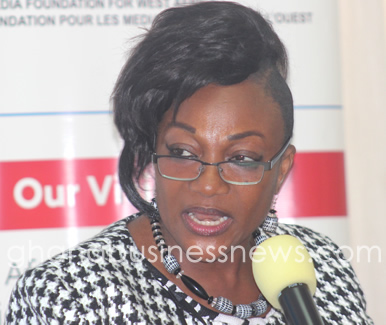Five-year strategic plan to eradicate ‘kayaye’ in the offing – Minister

A Five-year Strategic Plan to eradicate head porters (kayayee) from Ghana’s cities is being developed by the Ministry of Gender, Children and Social Protection, through the support of the United Nations Population Fund (UNFPA).
Madam Otiko Afisah Djaba, the Sector Minister, said the mapping of ‘kayayee’ was ongoing in the major markets across the country to gather data to inform the decision.
She said the Ministry was working with the GRATIS Foundation and the Kwame Nkrumah University of Science and Technology to manufacture robust trolleys for ‘kayayee’.
“We also plan to link these vulnerable women to small holder farming through the Planting for Food and Jobs initiative,” Madam Djaba stated on Tuesday, when her Ministry took its turn at the ‘Meet-The-Press’ series in Accra.
The Meet-The-Press engagement was to afford the Minister an opportunity to render account of her stewardship over the past 16 months and the way forward.
Madam Djaba said the Ministry had developed a Porterage Module to link women in rural communities to the government’s initiatives such as the One Village, One Dam; and the One District, One Factory to make them economically independent.
She announced that the Ministry had initiated a programme dubbed “Operation Get off the Street Now for a Better Life”.
She said the objective was to reduce the phenomenon of persons living on the street; adding that, data collection to create a database was ongoing with 4,098 children already registered.
She said a document on the framework and strategies on disability mainstreaming in the Metropolitan Municipal and District Assemblies (MMDAs) had been developed.
She noted that the provisions in the document served as a guide to the MMDAs on how to include disability issues in their development plans.
In the area of human trafficking, the Minister mentioned the finalisation, printing and dissemination of a National Plan of Action on Human Trafficking, which gives detailed implementation plan in fighting the menace in Ghana.
Madam Djaba said the Ministry had undertaken consultations on a number of bills and regulations to reflect the broader views of the public and government priorities for women, children and the vulnerable.
She said the Foster Care and Adoption Regulations were at the final stage of passage in Parliament, while the Affirmative Action Bill had been re-submitted to Cabinet for consideration and approval.
She noted that four bills – the Aged Persons, Social Protection, Persons with Disability and the Ghana School Feeding Bills would be taken through stakeholder consultations and subsequent submission to cabinet for approval.
She explained that existing legal documents and policies such as the Domestic Violence Act, the Human Trafficking Act, the Children’s Act were being translated into voice format in 11 Ghanaian languages for easy access by the public.
Within the period under review, she said to ensure the achievement of the Ministry’s mandate, a number of boards had been constituted in line with Acts of Parliament, to advise and provide technical support to the Ministry.
These include the Ministerial Advisor Board, the Human Trafficking Management Board, the Domestic Violence Management Board, the Cancer Board, the Adoption Board and the National Council on Persons with Disability Board.
She said as part of their efforts to ensure that all vulnerable and poor persons had access to quality health care, 550,000 Livelihood Empowerment against Poverty (LEAP) beneficiaries had either been registered unto the National Health Insurance Scheme (NHIS) or had their expired cards renewed.
She said the Ministry also re-launched the re-registration of 13,000 Prison Inmates onto the Scheme.
She said under the LEAP programme, the Ministry continuously made six successive bi-monthly payments to beneficiary households in 2017 and had conducted three payments as at May 2018 covering a total of 213,044 households nation-wide.
Madam Djaba said the Gender Ministry was working to make life better for the vulnerable and excluded to ensure that, no one was left out or behind in the socio-economic development of the country.
“My Ministry is responsible for the vulnerable, the excluded, the disadvantaged, the marginalised, the extreme poor, and the neglected. We need to break the barriers of social cultural norms, taboos and harmful traditional and cultural practices. We must look after each other as a community of Ghanaians.”
High profile dignitaries at the event were Dr Mustapha Abdul Hamid, Minister of Information and his Deputy Mr Perry Okudzeto.
Source: GNA
